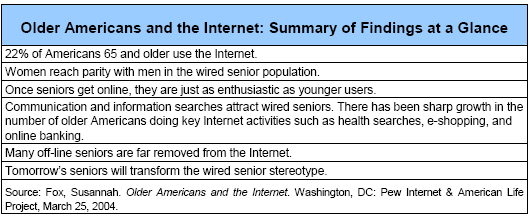Just 22% go online, but their enthusiasm for email and search may inspire their peers to take the leap
22% of Americans 65 and older use the Internet.
The percent of seniors who go online has jumped by 47% between 2000 and 2004. In a February 2004 survey, 22% of Americans age 65 or older reported having access to the Internet, up from 15% in 2000. That translates to about 8 million Americans age 65 or older who use the Internet. By contrast, 58% of Americans age 50-64, 75% of 30-49 year-olds, and 77% of 18-29 year-olds currently go online.
Women reach parity with men in the wired senior population.
In the year 2000, about 60% of wired seniors were men and about 40% were women. In February 2004, the gender ratio among wired seniors has shifted to 50% men and 50% women – the same ratio as the general Internet population.
Online seniors as a group are still made up predominately of whites, highly-educated seniors, and those living in households with higher incomes who have Internet access, although there have been gains in other segments of the seniors cohort since 2000. For instance, the number of seniors who live in households with moderate amounts of income has risen dramatically, as has the number whose education ended with a high school diploma.
Once seniors get online, they are just as enthusiastic as younger users.
Wired seniors are often as enthusiastic as younger users in the major activities that define online life such as email and the use of search engines to answer a specific question. Also, wired seniors are as likely as younger users to go online on a typical day.
Communication and information searches attract wired seniors. There has been sharp growth in the number doing key Internet activities such as health searches, e-shopping, and online banking.
Email is equally popular among Internet users age 65 or older and their younger counterparts. Fully 94% of wired seniors have sent or received email, compared to 91% of all Internet users.
There have been big increases since 2000 in the number of online seniors doing several key activities. It is important to stress, though, that even with these high growth rates, it is usually the case that online seniors have done these online activities at lower rates that younger Internet users.
- 66% of wired seniors had looked for health or medical information online at some point in their online life by the end of 2003. That is a 13-point jump since 2000, and a growth rate of 25%. And online seniors are much more likely than other Internet users to have logged on to get information about Medicare and Medicaid.
- 66% of wired seniors had done product research online by the end of 2003. That is an 18-point jump since 2000, and a growth rate of 38%.
- 47% of online seniors had bought something on the Internet by the end of 2003. That is an 11-point increase since 2000 and a growth rate of 31%.
- 41% have made travel reservations online by the end of 2003. That is a 16-point increase since 2000 and a growth rate of 64%.
- 60% of wired seniors had visited government Web sites by the end of 2003. That is a 20-point jump since 2000, and a growth rate of 50%.
- 26% of wired seniors had looked for religious and spiritual information by the end of 2003. That is a 15-point jump since 2000, or a growth rate of 136%.
- 20% of online seniors had done banking on the Internet by the end of 2003. That is a 12-point increase since 2000 and a growth rate of 150%.
Many off-line seniors are far removed from the Internet.
Most seniors live lives far removed from the Internet, know few people who use email or surf the Web, and cannot imagine why they would spend money and time learning how to use a computer. Seniors are also more likely than any other age group to be living with some kind of disability, which could hinder their capacity to get to a computer training center or read the small type on many Web sites.
Tomorrow’s seniors will transform the wired senior stereotype.
There is a burgeoning group of Americans who are slightly younger than retirees and who are vastly more attached to the online world. In February 2004, we find that 62% of Americans age 50-58 years-old and 46% of Americans age 59-68 have Internet access. By contrast, just 17% of Americans age 69 and older have access.
In fact, older Baby Boomer Internet users (between 50-58 years old) are more like Generation X Internet users (between 28 and 39 years old) than like their older, “Mature” generational neighbors (those between 59 and 68 years old). For example:
- 75% of Generation X Internet users and 75% of Baby Boomer Internet users get news online, compared to 67% of Mature users.
- 59% of Generation X Internet users and 55% of Baby Boomer Internet users do research online for their job, compared to 30% of Internet users between 59 and 68 years old.
The “silver tsunami” identified in the Pew Internet Project’s 2001 “Wired Seniors” report has gained momentum. As Internet users in their 50s get older and retire, they are unlikely to give up their wired ways and therefore will transform the wired senior stereotype.



